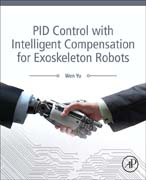
PID Control with Intelligent Compensation for Exoskeleton Robots shows readers how to use neural PD and neural PID controls to reduce integration gain, providing explicit conditions on how to select linear PID gains using proof of semi global asymptotic stability and local asymptotic stability with a velocity observer. These conditions are applied in both task and joint spaces, with PID controllers compensated by neural networks. Users will find this to be a great resource on how to combine traditional PD/PID control techniques with intelligent control. Proportional-integral-derivative (PID) control is widely used in biomedical and industrial robot manipulators. An integrator in a PID controller reduces the bandwidth of the closed-loop system, leads to less-effective transient performance, and may even destroy stability. Many robotic manipulators use proportional-derivative (PD) control with gravity and friction compensations, but improved gravity and friction models are needed. The introduction of intelligent control in these systems has dramatically changed the face of biomedical and industrial control engineering. Dr. Wen Yu presents several leading-edge methods for designing neural and fuzzy compensators with high-gain velocity observers for PD control using Lyapunov stability. Discusses novel PD and PID controllers for biomedical and industrial robotic applications, demonstrating how PD and PID with intelligent compensation is more effective than other model-based compensationsPresents a stability analysis of the book for industrial linear PIDIncludes practical applications of robotic PD/PID control, such as serial sliding mode, explicit conditions for linear PID and high gain observers for neural PD controlIncludes applied exoskeleton applications and Matlab code for simulations and applications INDICE: Proportional-integral-derivative (PID) control is widely used in biomedical and industrial robot manipulators. An integrator in a PID controller reduces the bandwidth of the closed-loop system, leads to less-effective transient performance, and may even destroy stability. Many robotic manipulators use proportional-derivative (PD) control with gravity and friction compensations, but improved gravity and friction models are needed. The introduction of intelligent control in these systems has dramatically changed the face of biomedical and industrial control engineering. PID Control with Intelligent Compensation for Exoskeleton Robots shows readers how to combine traditional PD/PID control techniques with intelligent control. Dr. Wen Yu presents several leading-edge methods for designing neural and fuzzy compensators with high-gain velocity observers for PD control using Lyapunov stability. PD/PID using intelligent compensation has proven much more effective than other model-based compensations. PID Control with Intelligent Compensation for Exoskeleton Robots shows readers how to use neural PD and neural PID controls to reduce integration gain, providing explicit conditions on how to select linear PID gains by using proof of semi global asymptotic stability and local asymptotic stability with a velocity observer. These conditions are applied in both task and joint spaces, with PID controllers compensated by neural networks.
- ISBN: 978-0-12-813380-4
- Editorial: Academic Press
- Encuadernacion: Rústica
- Páginas: 220
- Fecha Publicación: 01/10/2017
- Nº Volúmenes: 1
- Idioma: Inglés
